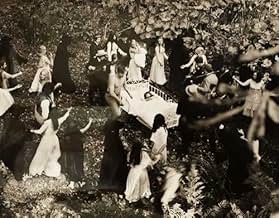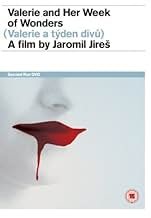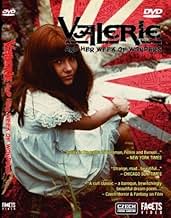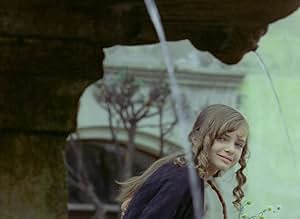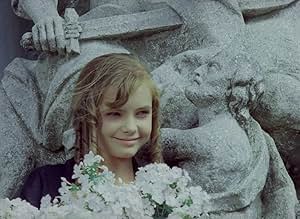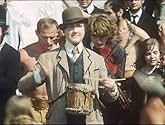Surreal dream-like tale that combines several themes into one fantastical world.Surreal dream-like tale that combines several themes into one fantastical world.Surreal dream-like tale that combines several themes into one fantastical world.
- Awards
- 1 win & 1 nomination total
Josef Abrhám
- Orlík
- (voice)
- (uncredited)
Jana Andresíková
- Sluzka z vykriceného domu
- (uncredited)
Alice Auspergerová
- Sluzka
- (uncredited)
Featured reviews
In the 1960s British TV screened a good number of European Fairy tales like 'The Singing Ringing Tree' for children (probably because they were cheap product). They were often strange and grotesque evoking a real sense of the uncanny nature of pre-sanitised fairy tales. Valerie and Her Weeks of Wonders is made in this vein. Redemption may market the film as a 'virgin comes into sexuality' 70s softcore film, but it offers something more than this. There is an enormous amount of care taken in the film's visual composition and the music. Standing on the border between horror and fairy tale it brings out the latent combination of erotic desire, aggression and fantasy that links the two genres. At times the film borders on the sublime with its evocation of dreamlike imagery. Centred around Valerie's quest to discover the identity of her parents they are revealed to be duplicitous shape changers - at one moment a handsome man or woman and the next a hideous vampire beast. Eschewing the rules of Hollywood linearity and character continuity this film re-creates subjective space and affords us a welcome space in which to dream.
An aimless but fascinating surreal fantasy a sort of adult-oriented version of 'Alice In Wonderland' with a distinctly Eastern European flavor VALERIE AND HER WEEK OF WONDERS was a revelation for me, and I am very glad I went the extra mile to acquire a copy of it on VHS.
The narrative makes little sense and, like I said, it does not lead to anywhere in particular, but the film's trump card is the incredible (and often poetic) beauty of its images. The film ostensibly deals with the sexual awakening of a teenage girl, though the way director Jaromil Jires goes about this is extremely complex yet effortlessly captivating, and very enjoyable to boot. It takes in a variety of dazzling psycho-sexual concepts drawn from religion and mythological folklore which come off as both inextricably modern and deeply provocative still.
The film features a number of sexual perversions throughout, which is pretty amazing when considering that the lead actress was only 13 years old at the time (though nothing too explicit is ever shown): she is involved in lesbianism, incestuous/Oedipal familial relationships, and is even subjected to an attempted rape by a young priest apart from being shown in various states of undress! In this way, it would seem to cater to the tastes of practically every broad-minded film-goer one can think of (be it art-house, horror or erotica), though it is arguable how well-known this film really is which is a pity.
The few elements we find here of the traditional horror film are worth expanding upon, however: we get a number of vampires (the leading member bears an unmistakable resemblance to the Max Schreck of NOSFERATU [1922]) who periodically revert to their formerly more human and youthful selves, if only to further disorientate Valerie and ensnare her in their volatile and greedy schemes. Finally we 'witness' Valerie being burned alive at the stake (as a witch), a punishment instigated by the same priest who had earlier seduced her. Still, she manages to emerge unscathed from her every crisis, thanks to a special talisman (in the shape of a pair of earrings) and the help of her goofy but devoted brother/lover, who goes by the name of Eagle!
Jaroslava Schallerova, who plays Valerie, is lovely and utterly charming throughout, striking a perfect balance between wide-eyed innocence and a curious sexual urge. Photography, sets, costumes and make-up are all wonderful (if obviously done on a low budget) - and the accompanying choral music is beautiful indeed, almost ethereal.
The by-now deleted Redemption PAL tape presented the film in a full-screen format (I'm not sure if this is the correct ratio or not); the print was far from pristine but perfectly acceptable for an obscure item such as this. I wonder who owns the U.S. rights, as I would love to see it get a much-deserved renaissance on DVD.
I cannot say whether VALERIE AND HER WEEK OF WONDERS was actually a one-off for this Czech film-maker, as I know very little about his other work. The only Jaromil Jires film available anywhere at the moment is THE JOKE (1969), by way of a reportedly substandard edition from Facets Video on VHS and DVD.
The narrative makes little sense and, like I said, it does not lead to anywhere in particular, but the film's trump card is the incredible (and often poetic) beauty of its images. The film ostensibly deals with the sexual awakening of a teenage girl, though the way director Jaromil Jires goes about this is extremely complex yet effortlessly captivating, and very enjoyable to boot. It takes in a variety of dazzling psycho-sexual concepts drawn from religion and mythological folklore which come off as both inextricably modern and deeply provocative still.
The film features a number of sexual perversions throughout, which is pretty amazing when considering that the lead actress was only 13 years old at the time (though nothing too explicit is ever shown): she is involved in lesbianism, incestuous/Oedipal familial relationships, and is even subjected to an attempted rape by a young priest apart from being shown in various states of undress! In this way, it would seem to cater to the tastes of practically every broad-minded film-goer one can think of (be it art-house, horror or erotica), though it is arguable how well-known this film really is which is a pity.
The few elements we find here of the traditional horror film are worth expanding upon, however: we get a number of vampires (the leading member bears an unmistakable resemblance to the Max Schreck of NOSFERATU [1922]) who periodically revert to their formerly more human and youthful selves, if only to further disorientate Valerie and ensnare her in their volatile and greedy schemes. Finally we 'witness' Valerie being burned alive at the stake (as a witch), a punishment instigated by the same priest who had earlier seduced her. Still, she manages to emerge unscathed from her every crisis, thanks to a special talisman (in the shape of a pair of earrings) and the help of her goofy but devoted brother/lover, who goes by the name of Eagle!
Jaroslava Schallerova, who plays Valerie, is lovely and utterly charming throughout, striking a perfect balance between wide-eyed innocence and a curious sexual urge. Photography, sets, costumes and make-up are all wonderful (if obviously done on a low budget) - and the accompanying choral music is beautiful indeed, almost ethereal.
The by-now deleted Redemption PAL tape presented the film in a full-screen format (I'm not sure if this is the correct ratio or not); the print was far from pristine but perfectly acceptable for an obscure item such as this. I wonder who owns the U.S. rights, as I would love to see it get a much-deserved renaissance on DVD.
I cannot say whether VALERIE AND HER WEEK OF WONDERS was actually a one-off for this Czech film-maker, as I know very little about his other work. The only Jaromil Jires film available anywhere at the moment is THE JOKE (1969), by way of a reportedly substandard edition from Facets Video on VHS and DVD.
Exquisite aesthetic is not enough for me, especially in itself. I want layered stratagems, nested worlds, the built of an oblique carpentry, the stuff that Lynch deals in, Wojciech Has, Ruiz; or a unified space impregnated with those things, as in the films of Antonioni or Resnais. I want magic, the spontaneous and impromptu, to well up from a familiar view of life, poetry from mundane essentials, for example the scenes of Tokyo roads in Solyaris is the most amazing rite of passage I have seen. It's passage from a tangible world.
With something like this I have no point of entry. There is no double perspective, or one foot in a world that matters. It's one long psychosexual dream stirred up from restless sleep, a young girl's guilt nightmare of a throbbing sexuality.
Life inside the grandmother's house is sterile, but outside it booms with activity and rigor. Of course once out there, the adult world poses a constant threat; its web of dark, barely comprehensible forces - none too subtly dressed up in monk garbs, there's also a demonic figure in black who addresses from the pulpit a congregation of fearful maidens - out to drink life from youth. The film appropriates suitable imagery from the vampire film.
So even though the artistry is excellent, the nightmare effective, I am just not at all interested in teasing out symbolic detail from a rural pageant. There is this one layer, and the most pressing question for the film seems to be how much of that is a dream. But again, something hardly worth puzzling over.
This is a problem in general with the surreal part of the Czech school; while inventive craftsmen, they cannot seem to layer their narratives around a solid, penetrating core. So we get beautiful but scattershot imagination. On the other hand, their comedies are superb for the same reason.
With something like this I have no point of entry. There is no double perspective, or one foot in a world that matters. It's one long psychosexual dream stirred up from restless sleep, a young girl's guilt nightmare of a throbbing sexuality.
Life inside the grandmother's house is sterile, but outside it booms with activity and rigor. Of course once out there, the adult world poses a constant threat; its web of dark, barely comprehensible forces - none too subtly dressed up in monk garbs, there's also a demonic figure in black who addresses from the pulpit a congregation of fearful maidens - out to drink life from youth. The film appropriates suitable imagery from the vampire film.
So even though the artistry is excellent, the nightmare effective, I am just not at all interested in teasing out symbolic detail from a rural pageant. There is this one layer, and the most pressing question for the film seems to be how much of that is a dream. But again, something hardly worth puzzling over.
This is a problem in general with the surreal part of the Czech school; while inventive craftsmen, they cannot seem to layer their narratives around a solid, penetrating core. So we get beautiful but scattershot imagination. On the other hand, their comedies are superb for the same reason.
Valerie is living with her grandmother and experiencing menarche, which triggers a series of dreams (or is it reality?) involving a vampire (or is her father?), a potential suitor (or is it her brother?), a long-lost cousin (or is it her rejuvenated grandmother-turned-vampire?). "Valerie" is a confusing and surreal film that is alternates between beautiful and nightmarish. The teenager who plays Valerie is pretty in an offbeat Bjorkish way, and an exceptional actress. I have a feeling this one gets better with subsequent viewings. Even though it is just over an hour long, the visuals are almost too much to take in all at once. Check it out if you are interested in seeing a bizarre and unique vampire film.
My Rating: 6.5/10.
My Rating: 6.5/10.
This is the best "girl gets her period" film I've ever seen. The week she comes of age, Valerie sees sex through many lenses. It is a very confusing time for her, full of danger and sensuality.
The film makes great use of color and music. The entire feature has a dreamy quality, not least because of the relentless and uneven symbolic representations. This film should be shown to every teenage girl, who should then go back and watch it again and again as she ages.
The film makes great use of color and music. The entire feature has a dreamy quality, not least because of the relentless and uneven symbolic representations. This film should be shown to every teenage girl, who should then go back and watch it again and again as she ages.
Did you know
- TriviaJaroslava Schallerová met the love of her life, Petrem Poradou, during the making of this film. Her mother was present on the set throughout the entire shooting of this movie.
- GoofsSeveral times throughout the movie people are picking up musical instruments and music is heard as if they are playing them but the fingerings don't match up with the notes, or sometimes no hand manipulation is done at all, just the appearance of playing the instrument. In one case, Eaglet is playing the flute and plays it horizontally when it is the vertical kind.
- ConnectionsFeatured in Resurrecting the Avant-Garde (2015)
- How long is Valerie and Her Week of Wonders?Powered by Alexa
Details
- Release date
- Country of origin
- Language
- Also known as
- Valérie ou la semaine des merveilles
- Filming locations
- Production company
- See more company credits at IMDbPro
Contribute to this page
Suggest an edit or add missing content


